I Really Need to Vent About Theater Production During the Elizabethan Era
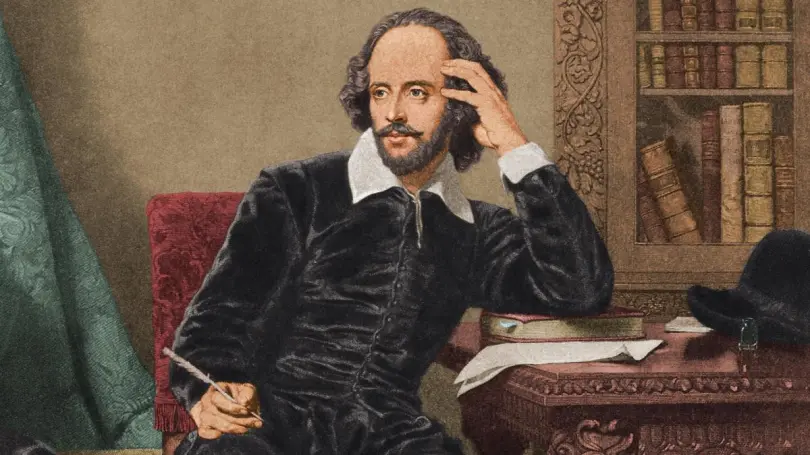
Note: This is a repost from my old Wordpress blog, I'm moving it here to archive and because I was thinking about it again.
So… we all remember that day in freshman English class. You sit down, and the teacher declares that it’s time to do the unit on William Shakespeare and the Globe/Kingsmen theater company. The whole class would be ‘cast’ in some play- maybe Romeo and Juliet, maybe Hamlet, maybe even a Midsummer Night’s Dream- and you would have to go around the room reading your part aloud in a monotonous hellscape of boring language from the 1500s. No one liked it, and everyone wanted it to end.
Maybe if you were lucky you were also a drama student, and you got to experience one of the bard’s plays with a little passion instead of this dull live reading followed-by-a-lecture that would bore anyone to tears.
Maybe you watched that movie with Leonardo DiCaprio that tried to use contemporary-for-the-time scenery, wardrobes, and props that made no goddamn sense because they didn’t change the dialogue to reflect those changes so folks were running around calling guns daggers and shit. Good lord that movie had a hard time. There were so many good actors trapped in that bad movie.
Anyway, my point is, we all had to do a unit on Shakespeare, and it seems that public school kids tend to take away the wrong impression on a number of things. I had a conversation about Shakespeare earlier today, and was kind of… amazed? We all have the same classes, so I don’t understand how these misconceptions exist, and it was bothering me, so I decided to get out all that frustration in this post.
Shakespeare in Love is Not a Documentary
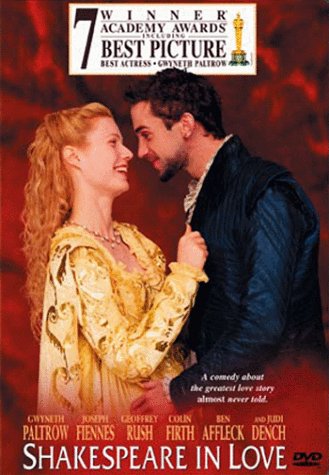
Now, if you’re like me, you only have the vaguest recollection of this movie. But if you’re like a lot of people, 7 Academy Awards mean a lot to you, and you incorrectly assume that a movie with such critical acclaim would not be rife with historical inaccuracies. You would be wrong. But the misconceptions that I see all seem to have appeared in this movie, so I think that it’s contribution to the Zeitgeist might be a big part of the problem.
Shakespeare’s Plays Weren’t Original Ideas
This is something that I’ve seen bandied about, and something that I genuinely think may have come from showing him as a struggling writer in the above-mentioned film. The vast majority of his works were adaptations of pre-existing stories that he made fit for theater- kind of like someone writing a screenplay based on a book or fairy tale or historical evet, but with less of the ‘writing a screenplay’ part for reasons that I’ll get to in a minute. For example, the play-within-a-play depicted in Shakespeare in Love: Romeo and Juliet, was an adaptation of the novel Giulietta e Romeo, by Matteo Bandello, which was itself based on the poem The Tragicall Historye of Romeus and Iuliet by Arthur Brooke. There was no reality where he was struggling to find an ending to a tale that he already knew the ending to, because all he was doing was adapting a story that already existed.
That absolutely is not to say that adaptations don’t require a great deal of talent. It’s just to say that I was shocked to find that people believed that these were original stories, and I feel like that really cheats the people who helped mold these stories, not just Shakespeare as some sort of monolithic god of a storyteller. That just isn’t how it happened.
Scripts Weren’t Really a Thing, and “Playwright” Didn’t Mean Then What it Means Now
Ok, so in Elizabethan England, literacy rates were absolute shit. And I know that we all adore our actors today, to the point where many of them can’t lead normal lives without being constantly hounded by paparazzi- but during the Elizabethan era, actors were much more like the acting troupe shown in A Midsummer Night’s Dream. They were actually considered super low-class, like, “You couldn’t even get a respectable trade” level low class. Really, if you could get on as an entertainer for some noble-high-ranking-hot-shot, you might be ok, but acting school wasn’t a thing, and acting wasn’t going to make you rich. It sure as hell wasn’t something that someone with a title or money went into. So… how are you going to do a script reading when most of your troupe looks at the script and sees meaningless squiggles?
So I want you to stop and think for a second. Put yourself in the shoes of a playwright who had to get a production done, with illiterate actors, in an era 200 years before viable printing presses were open to the public, with a time frame of only a couple of weeks from inception to stage.
This is an unthinkable obstacle in our day and age, so I understand why so many people have such a difficult time understanding the severity of it, or how these people could have possibly pulled it off. It’s so much easier to imagine Shakespeare sitting at a desk scribbling furiously out what we would today consider a “script” or a “screenplay”, having them printed up and distributed to actors who could then memorize them, rehearse, and put on the perfect performance.
But that’s simply unrealistic. It’s literally impossible, and until someone told me that they thought that was what had happened, I had never conceived of it, because of how just… completely off-the-walls impossible it would have been. But, I do understand that that is how we do things now, with high literacy rates and Google Docs and print shops and a theater season that lasts all year round in cultural meccas. This is what people in our contemporary society are accustomed to- so I suppose I can’t fault people for falling back onto this model.
But the reality is much more harsh.
Full scripts were not written out- that would take an obscenely long amount of time when everything was done by hand, and most of your crew wouldn’t be able to read them anyway. So the theatre companies used a method called “Cueing”- which actually survives today in the word “Cue”. A cue is, today, a mnemonic device used to help actors remember their lines, placements, and movements- and in the Elizabethan era this was also the case. However, cueing went much farther than that.
If you had actors who could read, and had enough time to produce them, you would create what was called a “cue script“- a written transcript of ONLY that one character’s lines, normally hastily scribbled (remember, you only had at most 2 weeks to do this, and in most cases you were on in 5 when you got these). You generally didn’t have enough time to memorize these, but it was better than literally nothing- which was the norm.
The literal nothing was called “cue acting“, and was the most common technique. A “playwright” would stand off curtain and tell the actors their lines in a stage whisper, one line at a time, and then the actors would “act” as they delivered them, projecting and emoting as necessary. This allowed the actors to work well even with the impediment of their own illiteracy, which, we must remember was often not the fault of a lazy student. These actors came from lower-class background in a time when public education was simply not a thing, printing was expensive, difficult, and rare, and even the most brilliant person born into bad circumstances was bound to be illiterate.
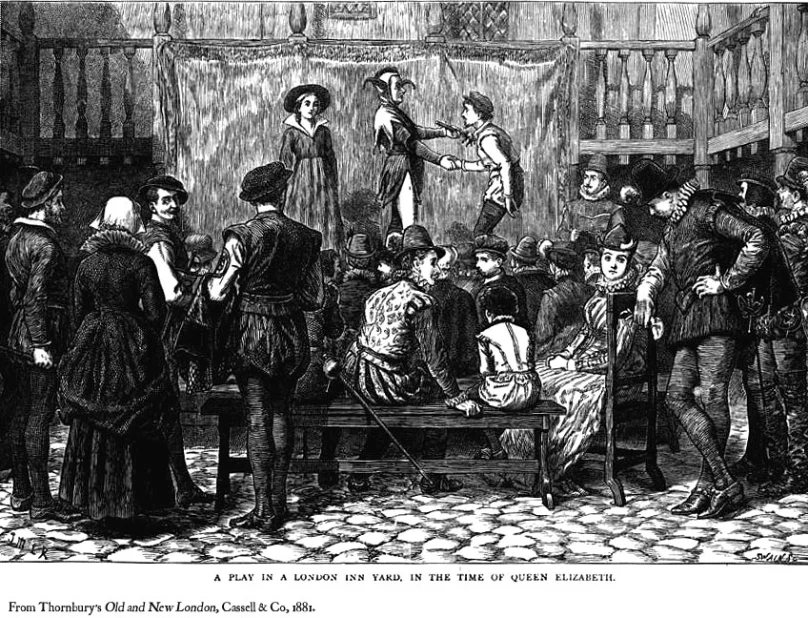
Acting Troupes Were Broke as Shit, and Considered Straight-Up Criminals
This method also had the added bonus of taking far less time than memorizing a pre-written script, and time was a luxury that actors of the era simply didn’t have. Because of the low reputation and socioeconomic status of the actors, they were prone to getting run out of town, usually by the clergy. A two-week engagement was considered a long-ass time to run a show, but a lot of the time, the show ran, “From when we get here until the cops find out“. They were considered “vagabonds”, and therefore the “Vagabond Act” would have had them arrested.
Acting wasn’t considered an actual “trade,” and therefore to not be considered a homeless bum dancing for quarters, you had to be licensed by the nobility in the particular area that you were performing at- something that was almost impossible to get. So for the vast majority of actors, rehearsal just wasn’t a thing- so cue acting was extremely important. You had someone feeding you your lines, and you were supposed to make it work on raw talent and determination.
This has made things a bit difficult for historians, as it means that written scripts in any kind of complete form that would have been contemporary for the time are neigh impossible to find. The cue cards that were sometimes used are rarely consistent and sometimes have different dialogue, even among the same troupe for the same play- so we’ll see similar but not-exactly-the-same versions of the same line. One of the most famous is Hamlet’s, “Alas poor Yorick, I knew him well.” and “Alas, poor Yorick, I knew him, Horatio.”
But Thank God Some Folks Wrote This Stuff Down
Also, many of the surviving transcripts are just that, transcripts. Literate people in the audience wrote down the plays, and sometimes just misheard things. So while this does make it difficult to determine exactly what the bard meant to be in each of his scripts, it does present a record of a true, gritty, living theater.
Shakespeare died broke and thinking that no one was going to remember him. On his birthday. So… that’s a thing that happened. He had good reason to believe that, though. The only thing he ever really wrote down were his poems, and poetry has never really been an industry known for its economic fortitude. His plays were considered then what, in contemporary language, would be called, “Redneck Dumbassery”- they were adaptations of famous stories, whispered to actors who hadn’t rehearsed, performed for commoners, by a troupe trying not to get arrested.
But they were good. And they were funny. And people liked them.
So two of the other vagabonds in Shakespear’s acting company decided that they couldn’t let their bro go out like that.
John Heminges and Henry Condell poured so much of their personal time and money into remembering, collecting notes and cue cards, hunting down people they had seen transcribing during their performances, and maybe even just bullshitting a little- and then taking everything to an expensive and time-consuming print shop in London- something usually reserved for the mega rich. At Jaggard & Son, they were able to create a published volume of the plays they were able to gather- though it is impossible to say how many were lost. Because of the nature of the beast we don’t have any original scripts- seeing as they weren’t a thing. All we know of Shakespeare came from his two bros wanting to preserve a legacy of a dude that they thought deserved to be remembered.
The English didn’t even put their own faces on their memorial statue. That’s a little bit bullshit.
I really, really hope that they played Rosencrantz and Guildenstern in Hamlet. I don’t know if they did or not just how goddamn poetic would that be?
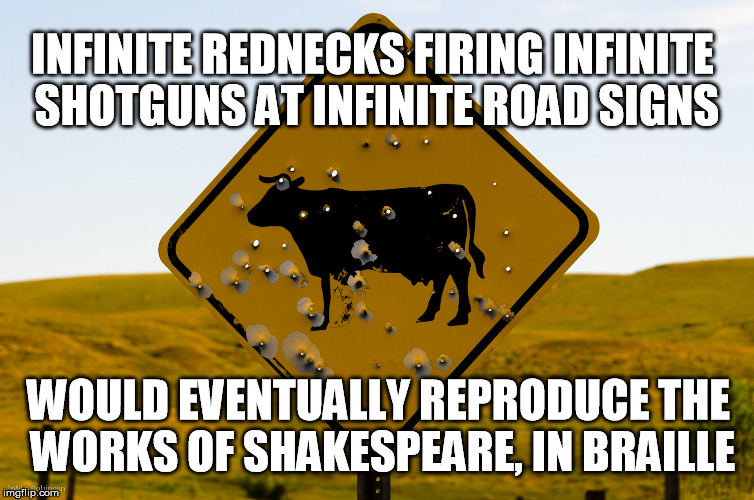
Everyone Sounded Like they Came Out of the Head of a Holler
For some reason that baffles me, people think Shakespear is, idk, fancy or someshit. Like they read a play about a teenage boy who gets so obsessed with some chick he met at a party that he decides to elope and then hangs out with a drug dealer for a little bit and eventually kills himself, and they think, “This was probably written for nobility”- as if that same goddamn thing didn’t happen to Billy-Bob down at the trailer park.
I see this a LOT and I’ve never understood it- and neither have theater historians. This is a flat-out weird thing to have happened. During his life his plays were considered low-class entertainment, and he never claimed they were anything else. This would be like… if in a couple centuries people were acting like Adam Sandler’s “Waterboy” needed to be performed in high-class accents. It’s really, really weird.
In 2004, the Globe Theater Company, which does still exist because Europe never throws anything away, decided to actually do some plays in the right accent, and found out that- yeah it would have been easy to do without a script, because half the damn thing was puns. Puns are really easy to deliver because it’s easier to goof off in improv than it is to improv something in the manner in which Shakespear is normally performed (in contemporary theater).
Here’s where shit gets really interesting for me. I grew up in Appalachia- and when I heard OP English (literally what the scholars are calling it) I was like, “wait, I know that accent”- and it turns out that American scholars and linguists from around the world knew it as well. Shakespeare had a redneck accent. When Romeo says, “What light through yonder window breaks?” It’s exactly the same as when I say, “What’s that over yonder?” Because the dialect I speak actually retains the same word usage and a very similar accent. Mine has, of course, evolved- but only very recently. My mamaw spoke nearly identically to OP English. Nobody says “afeared” unironically except Elizabethans and Appalachians.
Why?
That’s a question that interests me, especially because people have, for whatever reason, decided that Shakespear is high-class now, yet voice coaches will still tell you that if you want people to take you seriously, as an Appalachian you need to take your accent into a back-alley and shoot it right in the face. Well, the prevailing theory is that people who immigrated into the Appalachias from Europe kind of got… stuck. Those mountains aren’t easy to get through, especially in winter, and led to isolation, which itself led to incest and inbreeding jokes that just… aggravate the everloving shit out of everyone that lives here. Like… that’s not true and even if it was it wouldn’t be funny, it would be tragic.
I don’t want to get into the entire history of the Appalachian Regional Dialect here, because that’s a huge topic all to itself that should really have its own post if I’m going to go into it. I just want you to take away the bullet point that if you do a Shakespearean play in a redneck accent, you ‘unlock’ things that had been lost- mostly puns, but also the plays themselves are shorter (as you would expect from the way the plays were produced). The language has a faster pace than contemporary British English. And the dialect carries a connotation associated with the common people, which I think contemporary thespians are at risk of forgetting in regards to Shakespeare.
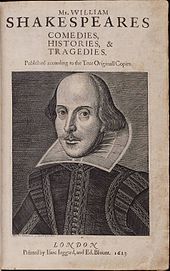
So That’s the End of My Shakespear Rant
But I really did have to get this all off my chest after the conversation I had earlier today. I think that if we let misunderstandings and corruption taint our zeitgeist, we are at risk of corrupting our history. And history is important. Objective truth is a thing.
fear that if we see Shakespear and others like him as larger-than-life figures who wrote out clean scripts to distribute to literate, trained actors and had money for things like frivolous printings, we risk losing our connection to culture. These plays were not the lofty playground of the elite. They were meant for the common rabble to enjoy. They were a hallmark of a place in history that reeked of sexism, a lack of hygiene, xenophobia, and other horrible things. They were not something to aspire to. We need to keep our hero-worship of the past in check, we need to keep our history true, or we are doomed to repeat it. We do the dead no favors by lying about them, by forgetting them and remembering an idol.
Now if you’ll excuse me, I have to exit stage left
Pursued by a bear.

Further Reading
Shakespeare’s Accent Sounded More American than British
Shakespeare’s Globe Official Handout
Unrehearsed Shakespeare Project – I’d like to call special attention here! These actors are performing Shakespearean plays via cue acting, as was originally intended! I think this is a wonderful project that will not only be entertaining but help to educate people!

